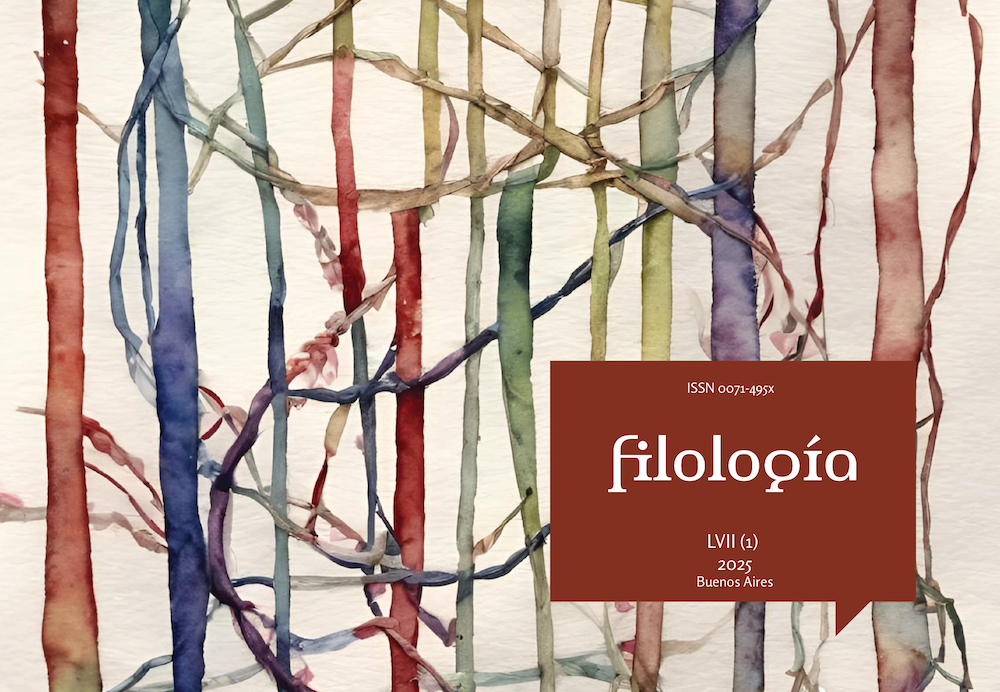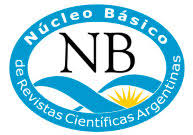Lexical Creativity and Semantic Underspecification in Abstract Nouns
Abstract
When speakers struggle to name or evaluate a referent, they often resort to lexical creativity, particularly metaphorical processes. This paper analyzes various groups of nouns that undergo resemanticization in abstract contexts. Nouns with originally concrete meanings, such as anestesia or ancla, acquire abstract, underspecified meanings that enable metaphorical and hyperbolic references to social situations. Similarly, nouns like balazo and cañonazo (whose established meanings specify the ontological subtype disparo) lose this specification in their neological sense, relying on context for interpretation. This underspecificity allows for their interchangeability. Finally, nouns denoting natural phenomena, such as diluvio, tormenta and tsunami, also become underspecified upon resemanticization, making them interchangeable with one another. In this article I focus on the analysis of the established and neological meanings of the following names: anestesia, ancla, filtro, pelotón, bolsón, tormenta, diluvio y tsunami. It has been observed that these nouns re-semanticize general like abstract nouns through metaphorical processes, giving rise to new, underspecified meanings. The general nature of these nouns is related to the variety of possible referents they present, which is reflected in an underspecified semantic structure. This study examines underspecification in the lexical field by exploring phenomena related to lexical creativity. Specifically, it investigates the boundaries between discursive metaphor and lexical metaphor in relation to nominal neologisms.Downloads
References
Adelstein, A. (2007). Unidad léxica y significado especializado: modelo de representación a partir del nombre relacional madre. Instituto Universitario de Lingüística Aplicada, Universidad Pompeu Fabra. Colección: Serie Tesis, 21. [También disponible en http://www.tesisenxarxa.net/TDX-0513108-173853/]
Adelstein, A. y Freixa, J. (Coords.) (2018-). Antenario. Diccionario de neologismos de variedades del español [Disponible en http://www.antenario.wordpress.com]. [ISSN 2938-513X].
Adelstein, A. y Boschiroli, V. (2015). Estatuto terminológico de nombres abstractos meronímicos de referencia general: descripción y propuesta de representación en diccionarios para la producción académica. Debate terminológico, 14, 30-54.
Adelstein, A. y Straccia, J. (2014). Nombres abstractos y neología semántica. En A. Adelstein (Ed.), Interfaces semánticas (pp. 25-43). Editorial FFyL-UNCuyo y Sociedad Argentina de Lingüística. Serie Volúmenes Temáticos de la SAEL.
Adelstein, A. y Straccia, J. (2016). Neología y delimitación de subclases nominales. En J. García Palacios, G. de Sterck, D. Linder, N. Maroto, M. Sánchez Ibáñez y J. Torres del Rey (Eds.), La neología en las lenguas románicas: recursos, estrategias y nuevas orientaciones (pp. 217-236). Peter Lang.
Adelstein, A. y Straccia, J. (3-5 de julio de 2017). Resemantización en nombres abstractos temporales [Ponencia]. I Congreso Internacional de Lexicología, Lexicografía y Terminología, Universidad Nacional de Córdoba, Argentina.
Adelstein, A. y Straccia, J. (2019). Nombres temporales: Hacia una clasificación según grados de abstracción. Revista Signos. Estudios de Lingüística, 52(100), 560-589.
Adelstein, A.; Kornfeld, L.; Kuguel, I. y Resnik, G. (7-10 de mayo de 2008). Morfología apreciativa y eventividad: el caso de -ón, -azo y -ada [Ponencia]. I Congreso Internacional de Neología en las lenguas románicas (CINEO), Barcelona, España.
Berri, M. y Straccia, J. (2015). Neología semántica nominal y contexto. En I. Alves y E. Simoes Pereira (Eds.), Neologia das Línguas Românicas (pp. 641-654). Editora Humanitas.
Cabré, T. (2006). La clasificación de neologismos: Una tarea compleja. Alfa, 50(2), 229-250.
Croft, W. y Cruse, D. A. (2008). Lingüística cognitiva. Madrid: Akal.
Cruse, D. A. (1986). Lexical Semantics. Cambridge University Press.
Cruse, D. A. (2004). Meaning in Language. An Introduction to Semantics and Pragmatics. Oxford University Press.
Francis, G. (1994). Labelling discourse. En M. Coulthard (Ed.), Advances in Written Text Analysis (pp. 83-101). Routledge.
García Meseguer, Á. (2007). Nombres concretos y abstractos: una propuesta de definición basada en pruebas sintácticas. ELUA: Estudios de Lingüística. Universidad de Alicante, 21, 137-170.
Geeraerts, D. (2010). Theories of Lexical Semantics. Oxford University Press.
Hanks, P. (2006). Metaphoricity is gradable. En A. Stefanowitsch y S. Gries (Eds.), Corpus-Based Approaches to Metaphor and Metonymy (Trends in Linguistics. Studies and Monographs 171) (pp. 1-16). Mouton de Gruyter.
Lyons, J. (1977). Semantics. Cambridge University Press.
Micu, C-S. (22-23 de septiembre de 2005). Noms abstraits/nombs concrets. Difficultés de classement [Ponencia]. European Integration: between tradition and modernity. The International Conference. Faculty of Sciences and Letters, Universitatea Petru Maior, Târgu Mureș, Rumania.
Petit, G. (2001). Dénomination et léxique. French Language Studies, 11, 89-121.
Pustejovsky, J. (1995). The Generative Lexicon. MIT Press.
Pustejovsky, J. (2011). Coercion in a General Theory of Argument Selection. Linguistics, 49(6), 1401-1431.
Pustejovsky, J. y Rumshisky, A. (2014). Mechanisms of Sense Extension in Verbs. En G. M. de Schryver (Ed.), A Way with Words: Recent Advances in Lexical Theory and Analysis. A Festschrift for Patrick Hanks (pp. 67-88). Menha Publishers.
Pustejovsky, J. y Jezek, E. (2016). Qualia Structure. En J. Pustejovsky y E. Jezek (Eds.), Integrating Generative Lexicon and Lexical Semantic Resources. Informe técnico, manuscrito inédito, Portorož, Slovenia. Disponible en http://gl-tutorials.org/wp-content/uploads/2015/12/GL-QualiaStructure.pdf.
Schmid, H.J. (2000). English Abstract Nouns as Conceptual Shells. From Corpus to Cognition. Mouton de Gruyter.
Straccia, J. (2017). Cambio semántico en nombres abstractos: modificación en los tipos de argumentos. En A. Marcovecchio y Y. Hipperdinger (Eds.), Asuntos gramaticales (pp. 59-68). EdiUNS.
Straccia, J. (2019). La estructura eventiva en nombres abstractos temporales. En D. Riestra y N. Mugica (Eds.), Estudios SAEL 2019 (pp. 89-104.) Editorial de la Universidad Nacional del Sur.
Straccia, J. (2024). Aspecto léxico y resemantización. Revista Rasal, 2024(2), 69-89. https://doi.org/10.56683/rsv2i014.
Corpus
[NOW] Corpus del español NOW de Mark Davies (2012-2019) (https://www.corpusdelespanol.org/now/).
[CPA] Hanks, P. (2004). Corpus Pattern Analysis. En Proceedings of Euralex.
Corpus de exclusión
Battaner, P. (Dir.) (2003). Diccionario de uso del español de América y España. Barcelona: VOX.
Haensch, G. y Werner, R. (Dirs.) (2001). Diccionario del español de la Argentina. Madrid: Gredos.
Plager, F. (Coord.) (2009). Diccionario integral del español de la Argentina [DIEA]. Buenos Aires: Tinta Fresca.
Real Academia Española (2018 [2014]). Diccionario de la lengua española. 23a edición. Disponible en [www.dle.rae.es]
Copyright (c) 2025 Julieta Straccia

This work is licensed under a Creative Commons Attribution-ShareAlike 4.0 International License.














